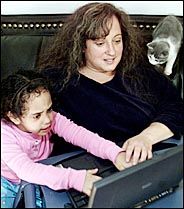It's no wonder she loves her kindergarten teacher, Mrs. McClusky, so much. At 5, she is smart for her age, anxious to please, anxious to learn. Mrs. McClusky's classroom is a home away from home, and a welcome one, since things don't feel so right at home these days. Mrs. McClusky always has an extra smile, an extra pat on the arm, an extra "Wonderful!" for a job well done.
At home her family, her older brother and sister, her parents, especially her father, well, and her mother too, seem to have other things on their mind. They try to make time to play with her--barbies or baseball or swinging on the rope swing, or riding or brushing the tall palimino named Angel. But she has been spending more and more time away from home too. At her favorite aunt's house, at her grandma's, next door at Debbie Lubert's house.
Every day when she climbs the steps of the big yellow school bus, she knows Mrs. McClusky will be waiting with her big smile and cups full of crayons. In her seat on the bus, like always, next to Marvin Johnson, who at first she kisses secretly in the back of the bus, and then later not so secretly in the front of the bus, she feels the attention that's missing at home.
This day in Mrs. McClusky's class is St. Patrick's day. It is also the feast day of her mother, Patricia, a devout Catholic. Mrs. McClusky makes an announcement that brings a wide-eyed, five-year-old smile to her face: This St. Patrick's day the class is making get well cards for her father, who'd had a gallbladder operation. He hasn't been feeling well, and Mrs. McClusky senses some cheering up is in order.
As she explains to the children what a gallbladder is, Mrs. McClusky launches the whole kindergarten class into a frenzy of green construction paper, paste, markers, crayons, and stickers.
Each child contributes their own work of art to help speed her dad's recovery--and she can hardly wait to bring the surprise home and share it with her family, her dad. She knows he'll love it. Her best friend Debbie's card is her favorite, a clover of sorts, with awkward crayon letters that spell out: "Feel Better." Mrs. McClusky helps the children write the words.
She takes care to be sure each card is special.
By the end of the day, 28 little kindergarten cards are placed in a brown paper sack for her to take home. She doesn't dare open the bag on the bus, not even to show to Marvin. This is her special surprise.
When the bus pulls up in front of her driveway, she sees her aunt's car. WONDERFUL! She'll be able to show her favorite aunt the big surprise. She can already sense how thrilled Aunt Penny will be when she sees all of the St. Patrick's Day cards her friends have made for her dad.
She bounds in the house and straight up the stairs toward her parent's bedroom. She knows her dad will be there; he has been resting a lot since his operation.
Her mother is standing at the top of the steps, waiting--she can hardly stop long enough to say Hi Mom. The bag tight in her hand, she wants to see her dad right away, see the look on his face, the way his lips make that slow smile, as she shows him his surprise present.
But her mother stops her. There. On the landing. Puts both arms out. Catches her. Crouches down. Looks in her eyes. Says she can't go in the bedroom just yet.
something.
but what.
wrong.
oh.
no.
read her face.
something.
Her mom steers her to the bedroom she shares with her teenage sister. "Aunt Penny's in your room. She needs to talk to you for a few minutes," her mom says.
Okay.
what
else
can she
do
Her mother takes the bag. She doesn't want to let it go. The bag is damp and already tearing at the top, where she held on to it so tightly all the way home, her moist palms wrapped around it.
She walks to her room and sees her Aunt sitting on the twin bed, watches her pat a make-believe seat beside her.
She sits down, hears her aunt talking, telling her that sometimes God needs people to be with him in Heaven sooner than we would like.
And she knows.
In fact, she has known in reverse. The knowing goes backwards you see.
She knew when he got sick, could read it, his eyes, the pain, and then she began the act of unknowing, because that is what you do when you're five and your dad is dying of pancreatic cancer but no one tells you.
You know, and then you spend the time in between the knowing and the dying trying to unlearn, undo, live backwards.
This is why the news doesn't surprise her, why she doesn't cry. Even when her aunt asks her would she like to. No, she says. She really doesn't feel like it.
What she feels like saying is, "I knew this, but then I didn't, and now I do again. And now I start living forward."
And what she feels like doing is going outside to play. With Debbie.
When she leaves her bedroom to find her mother, her mom is waiting to hold her, and although her mother reassures her that she is there for her, she feels only one thing: the deathly quiet, the abscence of, the without, the air suddenly made of cut-out figures--air, then nothing, then air again.
That is what breathing is like after.
Where he once stood, the worn walkway in the carpet, the bathroom where she would hear him throwing up, in these places she sees his absence, stark in its brightness, white like a paper doll punched through thin air. She sees only the missing pieces.
Here then
Gone
And you have no choice, begin to live forward.
And it really is just like that.



















